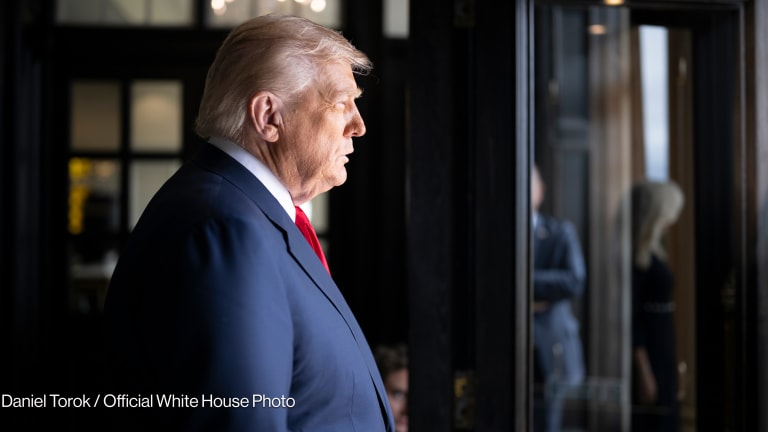
WASHINGTON — A battle for control over U.S. foreign aid spending is playing out in between the lines of a budget bill currently making its way through the U.S. House of Representatives.
Lawmakers have included new language and policy guidance in their latest foreign affairs budget bill — which passed through committee on Thursday — that pushes back against recent attempts by the Trump administration to retract foreign aid funding that had already been appropriated by Congress.
A provision buried on page 81 of the 230-page appropriations bill for the U.S. Department of State, foreign operations, and related programs would make a relatively minor change to an obscure budget process known as “rescission,” which gave U.S. aid advocates anxiety when the Trump administration considered using it last year.
The process allows for funding that Congress has already granted to be reclaimed and returned to the U.S. Treasury. Typically, when the White House introduces a rescission package, it places a 45-day freeze on the funding in question, and then gives Congress the opportunity to accept or reject the proposal.
Last August aid advocates caught wind of an Office of Management and Budget plan to introduce a rescission package that would include millions of dollars in foreign assistance funding — and to do so with only a month remaining in the fiscal year. The fear was that since the funding would be frozen for 45 days — past the end of the fiscal year — Congress would be unable to reject the rescission package in time to stop funds from expiring. The White House, facing strong pushback from Capitol Hill, never ended up taking that step.
Now lawmakers appear eager to prevent the same situation from occurring again.
The House bill stipulates that any funds targeted for rescission within 60 days of the date when they would otherwise expire will be made available for an additional 90 days.
In the report that accompanies the bill and clarifies some of the thinking behind its provisions, lawmakers explained that they were “concerned by an overreach in the programming of foreign assistance by OMB and the National Security Council.” They call on the Department of State, U.S. Agency for International Development, and other agencies to obligate the funding Congress provides “prudently, and in a timely fashion,” and note that OMB and the NSC should “enable, not obstruct, the use of such funds through the apportionment and notification process.”
'Haphazard' White House crackdown on human trafficking disrupts aid
The Trump administration's push to restrict aid to countries that are not doing enough to combat human trafficking has left development programs hanging. One U.S. lawmaker is worried the crackdown could impede efforts to combat Ebola.
The same budget bill takes aim at the Trump administration’s unusually strict interpretation of a law to prevent trafficking in persons. As Devex recently reported, the White House’s decision to issue fewer waivers to countries that do not meet anti-trafficking standards — and a lack of transparency about how those waiver decisions are being made — has created confusion and uncertainty among some USAID missions and their implementing partners.
The White House has elevated the issue of trafficking in persons as a foreign policy priority, including in an op-ed written by Ivanka Trump, which laid out the administration’s intention to “no longer use taxpayer dollars to support governments that consistently fail to address trafficking.”
The issue arose in Congress last week when Senator Robert Menendez introduced a bill to allow USAID to expand its activities in Democratic Republic of Congo, despite foreign aid restrictions the White House has sought to enforce.
Members of the House of Representatives relayed similar complaints in their report.
“The Committee is greatly concerned with the changed implementation of the Trafficking Victims Protection Act ... and the decision to not apply waivers for the poorest countries,” they wrote in the committee report.
The restrictions apply to countries that are placed on Tier 3 of the State Department’s trafficking in persons report, and they are meant to apply to nonhumanitarian assistance. Devex has heard complaints that lawmakers and aid implementers have been left in the dark about the administration’s criteria for deciding which programs should and should not be allowed to continue.
“The Committee believes that the discontinuation of social service programs for vulnerable people, such as livelihood, environment, and education programs, will have an adverse effect on anti-trafficking objectives and lead to communities being more vulnerable to trafficking. The Administration should use the waivers and authorities provided by Congress to preserve common-sense assistance programs,” the lawmakers added in the report.
A senior Democratic senate aide told Devex the White House’s decision to crack down on issuing waivers for Tier 3 countries has raised questions about whether this is a good-faith effort to prevent trafficking, or “another weird way for the administration to get its way to cut off foreign assistance and circumvent Congress’ will.”
A USAID spokesperson who shared information on condition of anonymity indicated to Devex that the USAID administrator could begin using more of his existing authority to grant waivers to certain programs.
“In consultation with the White House, USAID and the Department of State are reviewing options for proposing to use the exceptions allowed by the TVPA and exercising statutory notwithstanding authorities that could allow the continuation of certain programs, reviewed on a case-by-case basis, that involve governmental entities in countries on the Tier Three list, while ensuring compliance with the TVPA and the Presidential Determination on restrictions,” the spokesperson wrote.
USAID did not respond to a question about whether the administrator has used that authority in any instances so far.








